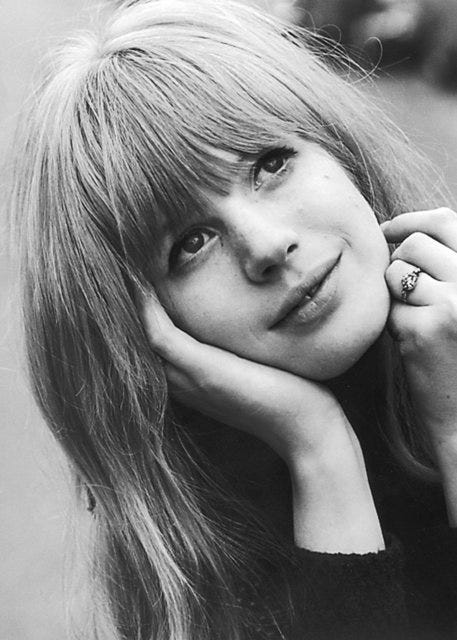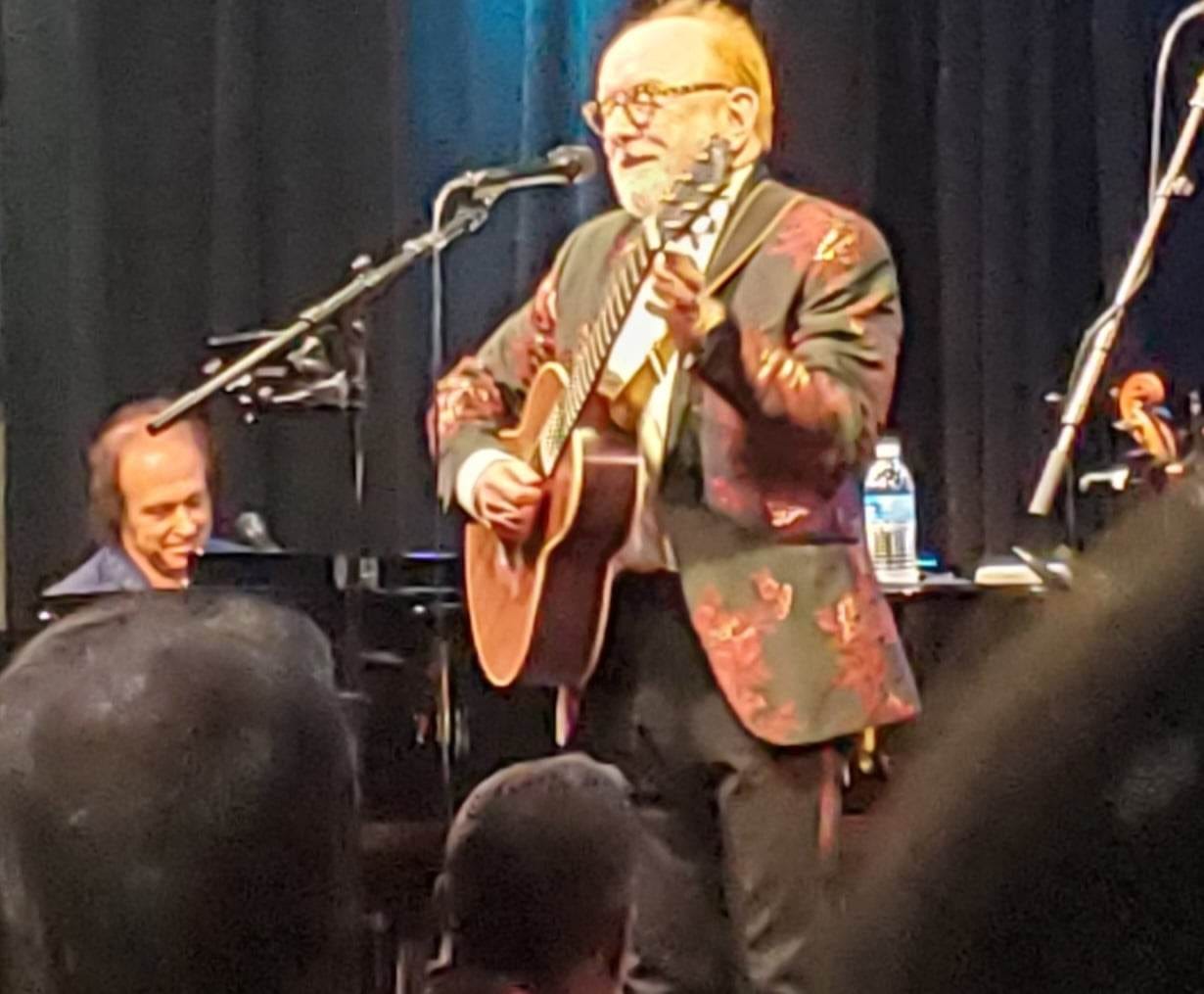The other day I was hanging around Santa Cruz, eating a taco and reading the local weekly paper, when I saw a teeny tiny ad for a show at a teeny tiny club, featuring Peter Asher. I was like, Peter Asher? The real Peter Asher? What the heck? The show was that night, in just a few hours. So, me being me, I went.
The ad said it was a, "multimedia performance," which sounded like it was going to be a power-point presentation. It also said it was $50 - 150$ and my god, I paid less to see Duran Duran: to pay that much for a power-point presentation seemed insane. However, I was having dinner with my sister, and we decided to explore the situation, and when we cruised by the club that evening, there was a line out the door of extremely aged people with walkers and canes outside, all looking extremely eager and clutching their paper tickets like olden times before QR codes took away all our memorabilia.
You know that feeling when, you think you didn't really want to do something very much, but when you see a whole ton of people sticking out of a club like a very excited tail, you immediately become desperate to get in? That was what happened. Those in line before us informed us it was sold out and that they’d bought their tickets ages ago, but we waited anyway, until everyone had hobbled inside, and then we asked the kind lady at the door if there were by any chance any leftover tickets, and she said YES, so we got in.
Peter Asher was one half of Peter and Gordon, a 60s pop group; in the 1970s he was best known as producer of albums by Linda Ronstadt and James Taylor, but he has also managed many other famous artists in his day. He is now 78 and on tour, and yes, he has a PowerPoint presentation, but he also has an acoustic guitar, a keyboard player, a drummer, and two red-headed young women dressed in swingin’ sixties-wear to play other interesting instruments on all his main hits, and they were just lovely. The show consisted of him telling stories from his past punctuated with renditions of the songs that were under discussion, and though it lasted two and a half hours, it seemed short.
Asher is what Malcolm Gladwell, in his book The Tipping Point, would call a connector: a person with a vast social network who is naturally skilled at making and keeping in contact with people and who has the knowledge and social skills to effectively spread an idea far and wide. Replace the word ‘idea’ with music and that describes Asher to a T. He grew up in post-War London, and spent his early years as a child actor, later forming a duo with a friend of his, Gordon Waller, with whom he attended a posh private school. Eventually Peter and Gordon were signed to EMI, whereupon the boyfriend of his sister Jane lent him a few of his castoff songs to record at his first session – a gambit that worked out pretty well, since Jane’s boyfriend was Paul McCartney.
The song he gave Peter to record, ‘A World Without Love,” went to number one, and Peter and Gordon found themselves at the center of the so-called British Invasion. For a few years, aside from his own career, Peter Asher’s daily life seemed to be all about rubbing shoulders with the musicians and artists that we now consider legendary: Mick Jagger and Brian Jones, John Lennon and Yoko Ono, Marianne Faithfull, Jeff Beck, Carol King, James Taylor, Linda Ronstadt, Diana Ross, Cher, and the list goes on.
Peter & Gordon could have just been a fluky 60s one hit wonder type groups, appearances on Shindig, Hullabaloo, Ed Sullivan and Dick Clark notwithstanding, but as a young man Asher had a deep interest in the production side of things and eventually became an a & r person for Apple Records and later, having moved to L.A., a producer and manager. The show that he put on at the Kuumbwa Jazz Center in downtown Santa Cruz drew on songs that were released within a more or less ten-year period, between 1965 and 1975, and they really showcased how fast music went from studio-made bubblegum pop to soulful singer-songwriter stuff – not to mention everything else in between. It kind of blows my mind to think that only 11 years after Peter and Gordon had a hit with “Lady Godiva,” the Sex Pistols released “God Save the Queen.” Jeez. Eleven years ago, the number one song was “Somebody That I Used to Know,” Carly Rae Jepson released “Call Me Maybe,” and LMFAO did “Sexy and I Know It” (very much the equivalent of Lady Godiva), all of which feel recent to me.
Time is a strange thing that way, I guess. But then, the years between 1966 and 1977 also included the assassinations of Bobby Kennedy and MLK, the Moon Landing, Woodstock, Nixon’s resignation, Roe Vs. Wade, and the end of the Viet Nam War. Maybe the speed of change in society was somehow reflected in the speed of change in the music at that time – pre-streaming, when the making of music was more organic.
Be that as it may, the set list at Kuumbwa included Peter and Gordon’s best-known numbers and also songs by Del Shannon, the Everly Brothers, Roy Orbison, Buddy Holly, and perhaps most poignantly, Marianne Faithfull’s Jagger-written hit “As Tears Go By.” “It is the evening of the day,” the band sang, and the words resonated especially hard because, well, it is, is it not? Me and all the people at Kuumbwa, we’re on our last legs now. I love reflecting on the past. But it’s not quite as wonderful as it was being a part of the future, like when me and my friends conspired to bring you all Nirvana.
That statement might sound boastful, but it’s the truth, and I know that Peter Asher would understand it, because he also isn’t shy, but nor is he arrogant: he understands the worth of what his stories are giving to people. After all, he has lived an incredible life. Hearing him talk about it in person was a bit like hearing a truly excellent podcast, but it was more than that, because there is something intangibly profound about being in the presence of a person who was in places, or experienced things, that have historical importance. It’s like meeting a Holocaust victim rather than just hearing about World War II. I suppose when you meet a person like Asher, who actually knew Brian Jones and was best man at Marianne Faithfull’s wedding and who introduced Yoko Ono to John Lennon, is a reassurance that such things DID happen. In our lifetimes even. It’s like the opposite of fake news, a way of stopping time in its tracks, and inserting ourselves into the narrative.
On the other hand, Asher’s monologue was also a reminder of the inevitable fiction of nonfiction. History is told by the winners, after all, and it’s the things you don’t hear that are often the most instructive. Peter Asher’s slant on the events he participated in are the kindest and gentlest possible, but that’s not the only way things might have gone done. For example, he told a lovely story of signing a band called the Iveys to Apple Records; the Iveys became Badfinger, and Asher played the song “Day After Day,” which is one of my favorite songs ever. It was so wonderful to hear it ringing out from the Kuumbwa Club, so gorgeous and evocative, but even as I appreciated its inclusion in this oral history – it was lovely, the way he has allowed that particular band a place in the main story -- I also felt sad, because I happen to know their story’s sad end. We sit and watch as tears go by, you know? We sit and watch, and if we’re lucky, we can also listen, and the record starts all over again.








Wonderful! And I’d have had no idea that it had even happened had I not read this.
Gina, I have had the honor and privilege to have had dinner with Mr. Asher on a few occasions. He is rather humble in a British way/. His history facinates me . He worked with all of my idles/ heros and outlaws. The way you describe his 'set up' in Santa Cruz with all that he is carrying on this
tour.. He is losing money. He maybe just doing it for the love of stories and history.